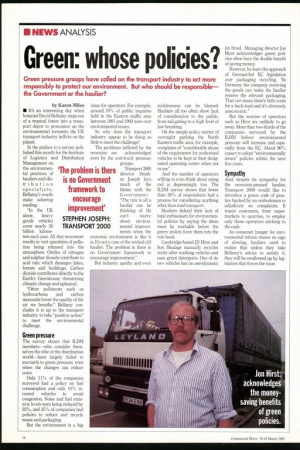Green: whose policies?
Page 16

If you've noticed an error in this article please click here to report it so we can fix it.
Green pressure groups have called on the transport industry to act more responsibly to protect our environment. But who should be responsible— the Government or the haulier?
by Karen Miles • It's an interesting day when botanist David Bellamy steps out of a tropical forest into a transport depot to pronounce on the environmental torments the UK transport industry inflicts on the planet.
In the preface to a survey published this month for the Institute of Logistics and Distribution Management on the environmental practices of hauliers and distribution specialists, Bellamy's words make sobering reading "In the UK alone, heavy goods vehicles cover nearly 30 billion kilometres each year. All that movement results in vast quantities of pollution being released into the atmosphere. Oxides of nitrogen and sulphur dioxide contribute to acid rain which damages lakes, forests and buildings. Carbon dioxide contributes directly to the Earth's Greenhouse; threatening climatic change and upheaval.
"Other pollutants such as hydrocarbons and carbon monoxide lower the quality of the air we breathe." Bellamy concludes it is up to the transport industry to take "positive action" to meet the environmental challenge.
Green pressure The survey shows that ILDM members—who consider themselves the elite of the distribution world—have largely failed to succumb to green pressure, even when the changes can reduce costs.
Only 11% of the companies surveyed had a policy on fuel consumption and only 10% rerouted vehicles to avoid congestion. Noise and fuel emission levels were being reduced by 22%, and 25% of companies had policies to reduce and recycle waste and packaging But the environment is a big issue for operators. For example, around 70% of public inquiries held in the Eastern traffic area between 1991 and 1992 were over environmental issues.
So why does the transport industry appear to be doing so little to meet the challenge?
The problems inflicted by the recession are acknowledged even by the anti-truck pressure groups.
Transport 2000 director Stephen Joseph lays much of the blame with the Government: "The rate is all a haulier can be thinking of. He can't worry about environmental improvements when the economic environment is like it is. It's not a case of the wicked old haulier. The problem is there is no Government framework to encourage improvement."
But industry apathy and even recklessness can be blamed. Hauliers all too often show lack of consideration to the public, from tail-gating to a high level of law-breaking.
On the simple policy matter of overnight parking the North Eastern traffic area, for example, complains of "considerable abuse of the requirement for authorised vehicles to be kept at their designated operating centre when not in use".
And the number of operators willing to even think about using rail is depressingly low. The ILDM survey shows that fewer than 20% of respondents had a process for considering anything other than road transport.
Hauliers defend their lack of total enthusiasm for environmental policies by saying the ideas must be workable before the green zealots force them into the rule book.
Cambridge-based JD Hirst and Son Haulage manually recycles water after washing vehicles and uses green detergents. One of its two vehicles has an aerodynamic kit fitted. Managing director Jon Hirst acknowledges green policies often have the double benefit of saving money.
However, he fears the approach of German-led EC legislation over packaging recycling "In Germany the company receiving the goods can make the haulier remove the relevant packaging. That can mean there's little room for a back-load and it's obviously uneconomic."
But the worries of operators such as Hirst are unlikely to go away. More than two-thirds of the companies surveyed by the ILDM believe environmental pressure will increase and especially from the EC. About 90% expect to adopt "environmentally aware" policies within the next five years.
Sympathy And, despite its sympathy for the recession-pressed haulier, Transport 2000 would like to introduce a green code of practice backed by an ombudsman to adjudicate on complaints. It wants customers, from supermarkets to quarries, to employ only those operators sticking to the code.
As consumer hunger for environmental reform shows no sign of slowing, hauliers need to realise that unless they take Bellamy's advice to satisfy it, they will be swallowed-up by legislation that forces the issue.




















































































